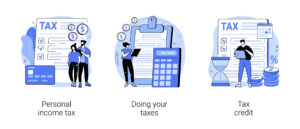How Do Profitable Traders Save on Their Taxes?
Stock trading is an up-and-down endeavor and investors can win big, lose it all or maintain an even keel. For those investors that achieve a high level of success and become profitable traders the next trick is to learn how to save on taxes. That can be a completely different game in and of itself. So what can you do to keep your tax bill down if you have been a profitable investor?
There are many strategies that successful investors employ to save on taxes, including deducting their home office expenses. Many traders work out of their home and that means they can deduct their work space, their electronic equipment and several other items. It could be as much as 10 – 20 percent of their home. This can be a very helpful deduction for investors as well as anyone who works out if their home.
Another smart move that successful traders make is to deduct their business travel, as well as their expenses for seminars and education. Many traders can also deduct their health insurance premiums. Retirement plan contributions can also be tax deductible if a trader qualifies for tax trader status. He/she also has to use an S-Corp or C-Corp management company to qualify. As for highly successful traders with a lot of income, they should consider a defined-benefit plan. These plans can allow for much larger tax-deductible contributions.
One other smart move is to save on taxes with long-term capital gains. If you hold an investment for 12 months or longer your capital gains tax rate is lower than when you sell an asset that you’ve held for less than a year. All of these steps are possible options for traders who want to cut back on their tax bill. You can contact GROCO to learn more about these and other tax-saving options. Call us at 1-877-CPA-2206
Income the IRS Can’t Touch
Income the IRS Can’t Touch There’s one readily available and legal source of untaxed income that we know of: municipal bonds. These securities are issued by state and local governments, school districts, hospitals and other public agencies to support community projects and services. To permit these worthy endeavors to raise money economically, Uncle Sam exempts…
Avoiding Real Estate Tax Revaluations
Avoiding Real Estate Tax Revaluations by Steven Singer, CPA As a result of the passage of Proposition 13 almost thirty years ago, real estate owners currently enjoy paying property taxes based on the property’s purchase price, value of improvements and an annual increase of 2% over the previous years’ assessed value. As a result of…
Annuities in Qualified Retirement Plans
Annuities in Qualified Retirement Plans By Russell Hill Using annuities in qualified retirement plans. Qualified annuities reduce your current taxable salary in addition to accumulating tax deferred earnings, when you contribute money to an annuities program through an employer (as one of the investment options in a salary reduction retirement plan). Those who work for…
Paying Too Much In Taxes?
Paying Too Much In Taxes? By Theodore Lanzaro Now that the end of the year is near, it is time to review a few business tax tips for 2008. Anyone who owns a business or is planning to start a new business in 2008 should be thinking about maximizing the profitability of their business and…


